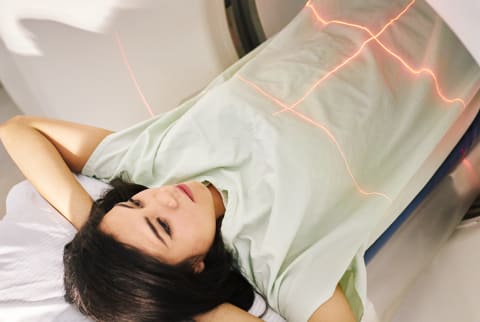Advertisement
3 Tests That Can Offer A More Precise View Of Your Health, From An Integrative MD


In the era of precision medicine, we can now collect tons of data on ourselves—such as testing our genes to make intentional choices about nutrition or fitness. Most importantly, we want to know what information we can obtain that will help us take action to prevent or prolong the onset of a certain medical problem.
That's why I'm a big proponent of utilizing various tests that take pictures of our bodies (known as imaging tests), which hold valuable information. While insurance companies may not reimburse these tests, if the cost is manageable for you, the information you will glean is well worth the price.
Here are the three imaging tests I often recommend to my own patients, to help get a better picture of their overall health:
Body composition scan
One of the most valuable tests that one could do is a body composition scan, in the form of a rapid MRI (no radiation or contrast), which can cost about $200.
These kinds of rapid scans give us an idea of how much muscle and fatty tissue is in our body. Think of it as your "internal BMI." Classical BMI is simply a measure of weight and height; however, there is so much more to consider beyond that. In fact, this noninvasive way of looking at your insides is an excellent tool for understanding what your possible risks may be for diabetes, liver disease, cancer, and heart disease.
And, here's a reality check: Yes, it is possible to look thin on the outside but have plenty of fatty tissue on the inside. Have you ever seen someone who looked like they were in shape but then had a heart attack? These stories happen more often than you think.
If we understand what is going on with our bodies, then we can make personalized choices for ourselves so that we can live longer, healthier lives. Also, we have a more accurate and precise metric to follow rather than just weight.
It's further important to note that as we age, our muscle mass may change; this is a condition known as sarcopenia. If we use this sort of precision-based testing, we can get an understanding of where our muscular weaknesses may lie so that we can specifically work on those areas to prevent excessive muscle loss over time.
CT coronary calcium scan
Another one of my most favorite tests is a CT coronary calcium scan. These are readily available, as well, and may not cost you more than $100 to get in many places. Yes, this is a CT scan, so there is radiation exposure. However, it is a quick, low-dose CT scan (and the radiation is comparable to an X-ray).
This quick and easy method can give your doctor a glimpse of what the plumbing in your heart is looking like. When we get buildup in our heart, we can develop problems like high blood pressure, chest pain, shortness of breath, or even a heart attack. This is useful as a preventive test because it is readily available, cost-effective, and can give you tons of information regarding your risk for a cardiac event.
You would be surprised how many people have moderate to severe heart disease and they just don't know it. By getting a score on this type of scan, you can get an idea about whether you are at a very low risk or a very high risk (or somewhere in between) for heart disease. With excellent and accurate tests like this, we can now gain insight into how we are wired and make an intervention before there's ever an issue.
Whole-body MRI
Many people may choose to pursue a whole-body MRI as part of a cancer screening protocol. This can also be a very valuable test for discovering risks you might have or understanding if you have a problem before it really becomes a "problem." I find this kind of screening test to be very useful when building a prevention strategy with patients.
More specific imaging tests like a cardiac MRI might be able to identify structural problems with your heart that you might not have known about otherwise. Dedicated brain MRIs can also be very valuable tools, especially when they can measure the volume of a part of your brain called the hippocampus, as it gives a clearer picture as to your risk for neurodegenerative diseases like Alzheimer's.
Now, it is important to note that these tests are going to be more expensive than the first two we discussed. But at the same time, this is a different kind of test and offers us insights into some very important elements of our health. Pricing may vary depending on where you go, so it is important to seek out good-quality, reliable centers to make sure you get the best value for the cost.
The takeaway.
Each of these tests can play a role in comprehensive imaging evaluation. However, I would strongly encourage starting with a body composition scan and a CT coronary calcium scan since they're slightly more accessible options for learning about your body and what's going on inside.
What gets me excited about these kinds of tests is that we can combine these results with other data, like your genetic risks, nutritional genetics, microbiome deficiencies, sensitivities, environmental toxicities, mitochondrial health, and many other parameters. When we do this, we can really home in on not only what your risks are but how we can address those risks. This is what the art and true meaning of precision medicine is all about.